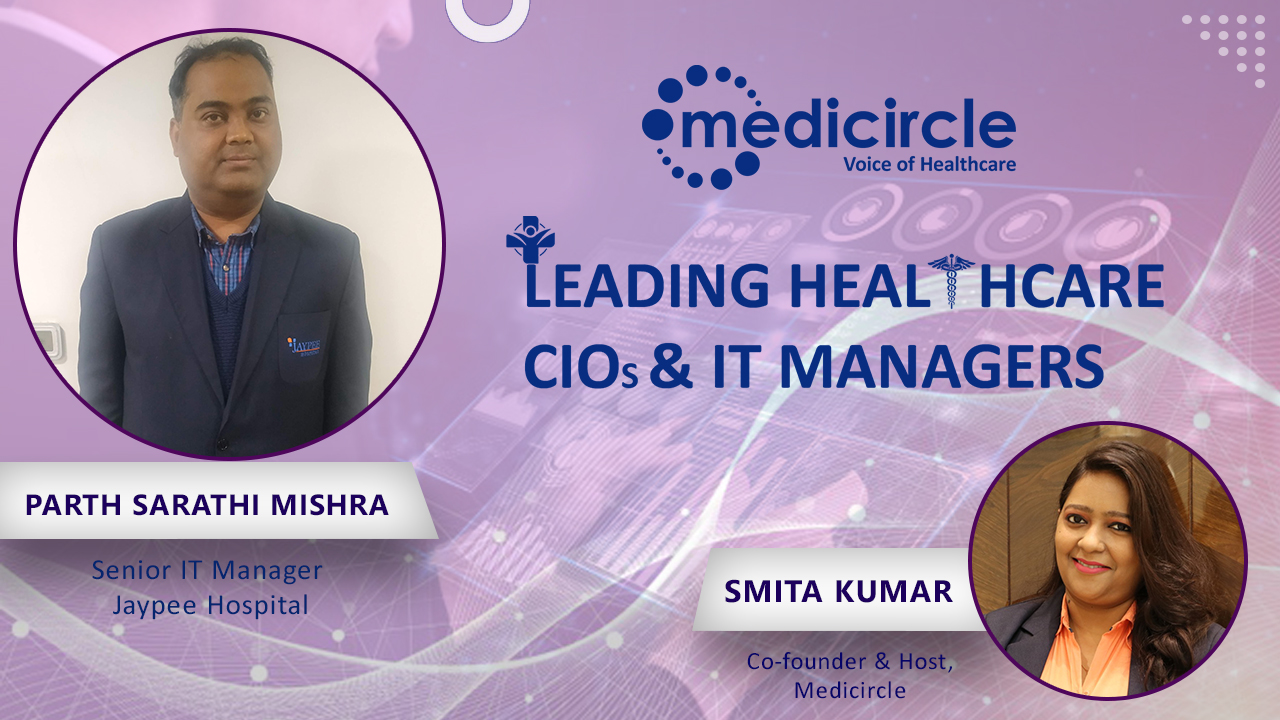Information technology has revolutionized patient care on a global scale. More and more healthcare providers are taking steps to change how their businesses are managed. As healthcare is moving towards digitalization, there are many challenges that IT professionals face. Medicircle has come up with a special series to delve into the challenges and opportunities faced by the IT managers of healthcare organizations.
Parth Sarthi Mishra is a Senior Manager of IT working at Jaypee Hospital, Noida, and has 12 years of enriching experience of on-site and off-site implementations of Healthcare Management Information Systems across regions like the Middle East, Africa, and Asia.
Jaypee Hospital, Noida is committed to serving those who seek dedicated, quality, and affordable healthcare through its multi-super specialty facility. With the latest diagnostic services and state-of-the-art technology, Jaypee Hospital strives to be the ultimate choice for medical care.
IT Personnel cannot Afford to go Wrong in Seamless Integration and Security of Patient Record
Parth emphasizes some significant responsibilities and challenges of IT personnel:
-
“As IT Manager, the most important challenge is the seamless integration of the various systems that we are using in the hospitals. We don't have a single software or a solution for the entire hospital, Rather, we have to use multiple systems like hospital information systems for billing or inventory management, EMR or electronic medical records for the consultants, patient feedback system, or CRM for patient management. Seamless integration of all these systems is a major challenge.
-
Coordination with different departments of the hospitals taking into consideration their pressing schedules is also not easy for IT personnel who have the responsibility of ensuring that hospitals as a whole run in an efficient manner.
-
Security of sensitive and confidential patient information is the primary responsibility, where we cannot go wrong” says Parth.
IT is the Backbone of Healthcare - Consultants and Patients understand this
Parth explains, “Healthcare IT solutions like an electronic medical record, teleconsultations, etc. were earlier considered a luxury. Most of the time hospitals used technology for billing and inventory management purposes only. But now, even electronic medical records and telehealth solutions are considered essential for healthcare organizations. Even the consultants are now adopting the new EMR and they prefer writing on mobile devices; mobile or laptop instead of writing in the physical format. So, we are finding more acceptance from the consultants as well as patients as there are reduced medication error and reduced pilferage due to seamless integration between the different departments,” Parth informs.
Going Virtual is the In-thing
Parth observes, “In earlier days we used to think that the only way to get healthcare is through face-to-face interactions between a consultant and a patient. IT personnel had to convince both the consultants as well as the patients to use telehealth solutions. The pandemic has changed the scenario and the outlook of people. There is acceptance as well as the demand of virtual consultations at the consultant as well as patient’s end. Patients have even become comfortable in entering their medical records in the interface meant for them instead of being dependent on the clinical staff."
IT Manager’s Job is Challenging but Interesting
Parth says, “Based on the experiences of working in some good and modern hospitals and helping in major implementations in the EMR and inventory management systems and developing software solutions in telehealth, I find my job role challenging but very interesting. It feels great to directly affect the patient or directly interact with the patient and be the agents of change in the healthcare with the help of information technology," Parth says.
(Edited by Amrita Priya)

 “Electronic medical records and telehealth solutions are no more luxuries, rather essential demands of consultants and patients these days,†says Parth Sarthi Mishra, Senior IT Manager, Jaypee Hospital, Noida.
“Electronic medical records and telehealth solutions are no more luxuries, rather essential demands of consultants and patients these days,†says Parth Sarthi Mishra, Senior IT Manager, Jaypee Hospital, Noida.










.jpeg)




.jpeg)

.jpg)













